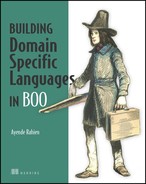About this Book
This book is meant for intermediate to advanced .NET developers who are interested in using domain-specific languages in their applications.
If you are new to language-oriented programming, this book will teach you how to create, build, and maintain your own languages.
If you are experienced with language-oriented programming, this book will give you all the practical knowledge necessary to easily build DSLs using the Boo programming language.
Note, however, that this book is focused on the practical side of building DSLs. While I talk about the theory underlying this field, I focus on practical aspects. If you are interested in learning more about DSLs, I also recommend reading Martin Fowler’s forthcoming book on the topic: http://www.martinfowler.com/bliki/DomainSpecificLanguage.html. The book isn’t finished yet, but much of the content can already be found on his site.
Roadmap
This book has five main sections.
Chapters 1–2 discuss DSLs in general, introduce the Boo language, and explain why I chose to use it as the basis for my DSL adventures.
Chapters 3–5 walk through the implementation of several different DSLs, their integration into applications, and all the various concerns you’ll have to deal with when you add a DSL to your project.
Chapters 6–7 dive into advanced language manipulation and the infrastructure required to build an industry-strength DSL.
Chapters 8–11 go into the details surrounding a production-worthy DSL implementation: building testable languages and test languages, creating versionable DSLs, working with user interfaces for the languages, and documenting them.
Chapters 12–13 talk about implementation challenges for DSLs and walk through the steps of building a full real-world DSL example.
Two appendixes conclude the book. Appendix A is a basic Boo reference, familiarizing you with how to use Boo as a programming language, while appendix B covers the Boo language syntax.
Code conventions and downloads
All source code in listings or in text is in a fixed-width font like this to separate it from ordinary text. Source code for all working examples in this book is available for download from the publisher’s website at www.manning.com/DSLsinBoo.
You can download the binary distribution of Boo from the Boo website at http://boo.codehaus.org. For more information on using Boo once you’ve downloaded it, please see page 23.
Author Online
The purchase of DSLs in Boo includes free access to a private web forum run by Manning Publications, where you can make comments about the book, ask technical questions, and receive help from the author and from other users. To access the forum and subscribe to it, point your web browser to www.manning.com/DSLsinBoo. This page provides information about how to get on the forum once you’re registered, what kind of help is available, and the rules of conduct on the forum.
Manning’s commitment to our readers is to provide a venue where a meaningful dialogue between individual readers and between readers and the author can take place. It’s not a commitment to any specific amount of participation on the part of the author, whose contribution to the book’s forum remains voluntary (and unpaid). We suggest you try asking him some challenging questions, lest his interest stray!
The Author Online forum and the archives of previous discussions will be accessible from the publisher’s website as long as the book is in print.
